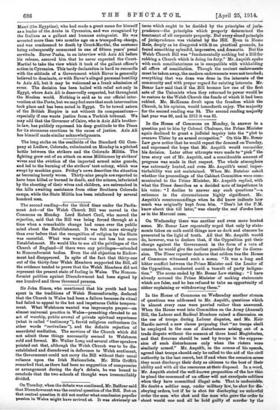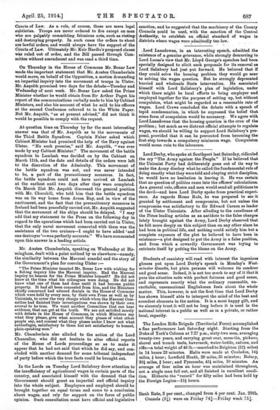In the House of Commons on Wednesday another stream of
questions was addressed to Mr. Asquith, questions which in almost every case were parried rather than answered. When the House went into Committee on the Army (Annual) Bill, the Labour and Radical Members raised a discussion on the use of troops during Labour disputes, and Mr. Keir Hardie moved a new clause proposing that "no troops shall be employed in the case of disturbances arising out of a. trade dispute without the consent of three local Magistrates, and that firearms should be used by troops in the suppres- sion of such disturbances only when the rioters were similarly armed." Mr. Asquith, in the course of his speech, agreed that troops should only be called to the aid of the civil authority in the last resort,. but if and when the occasion arose they must discharge their duty as citizens to the best of their ability and with all the resources at their disposal. In a word, Mr. Asquith stated the well-known proposition of the law tkat to plead the command of an officer will not exculpate soldiers when they have committed illegal acts. That is undeniable. No doubt a soldier may, under military law, be shot for clis obeying orders, but if he is shot for disobeying an unlawful order the men who shot and the man who gave the order to shoot would one and all be held guilty of murder by the Courts of Law. As a rule, of course, these are mere legal subtleties. Troops are never ordered to fire except on men who are palpably committing felonious acts, suck as rioting arid destroying property. In :such cases the orders to shoot are lawful orders; and would always have the support of the Courts of Law. Ultimately-Mr. Heir Hardie's proposed clause was ruled out of order, and the Bill passed through Com- mittee without amendment and was read a third time.



























































 Previous page
Previous page